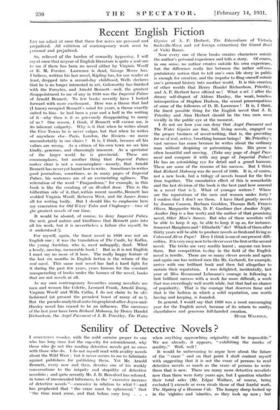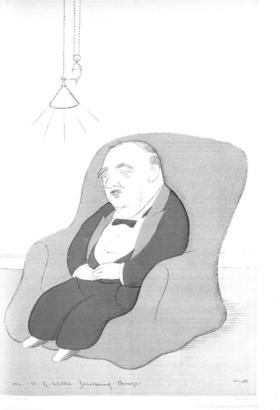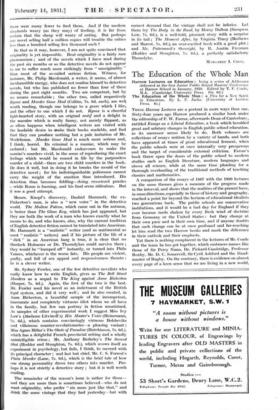Senility of Detective Novels ?
I SOMETIMES wonder, with the mild surmise proper to one who has long since lost the cap teity for astonishment, why those who jo not like reading detective novels get so cross with those who do. I do not myself read with avidity novels about the Wild West ; but it never occurs to me to fulminate against publishers for publishing them. Yet Mr. Arnold Bennett, every now and then, devotes one of his weekly conversations to the iniquity and stupidity of detective novelists ; and quite recently Mr. J. D. Beresford has referred, in tones of unconcealed bitterness, to the " excessive increase of detective novels "—excessive in relation to what ?-and has prophesied that " the craze must be ephemeral," that ' the time must come, and that before very long . . .
when anything approaching originality will be impossible." We are already, it appears, " exhibiting the marks of senility." Well, well !
It would be unbecoming to argue here about the future of the " craze " and on that point I shall content myself with suggesting that it is not the craze of persons to read detective novels so much as the craze of persons to write them that is new. There are many more detective novelists now than there were forty years ago, but I question whether their total sales (Mr. Edgar Wallace, of course, being excluded !) exceeds or even rivals those of that fearful work, The Mystery of a Hansom Cab. The hungry sheep looked up in the 'eighties and 'nineties, as they look up now ; but
there were many fewer to feed them. And if the modern shepherds weary (as they may) of feeding, it is far from certain that the sheep will weary of eating. But perhaps one novel selling half a million copies will trouble the critics less than a hundred selling five thousand each ?
Be that as it may, however, I am not quite convinced that originality is yet impossible. Real originality is a fairly rare phenomenon ; and of the novels which I have read during the past six months or so the detective novels do not appear to me to suffer much more strikingly. from " unoriginality "
than most of the so-called serious fiction. Witness, for instance, Mr. Philip Macdonald, a writer, it seems, of almost inexhaustible energy, who does not confine himself to detective novels, but who has published no fewer than four of these during the past eight months. Two are competent, but by
no means remarkable ; the other two, called respectively Rynox and Murder Gone Mad (Collins, 7s. 6d. each), are well worth reading, though one belongs to a genre which I like, and the other to one which I do not. Rynox is a cheerful light-hearted story, with an original motif and a delight in the macabre which is really funny, not merely flippant, as so often happens when intelligent writers are visited with the laudable desire to -Make their books readable, and find that they can produce nothing but a, pale imitation of Mr. Wodehouse. Murder Gone Mad is much more serious and, I think, horrid. Its criminal is a maniac, which may be endured ; but Mr. Macdonald endeavours to make the maniac's murders vivid, in the sense of reproducing the exact feelings which would be roused in life by the purposeless murder of a child—there are two child murders in the book. He does it well, but in doing it he breaks the mould of the detective novel ; for his indistinguishable policemen cannot carry the weight of the emotion thus introduced. His detection thus becomes fiddling—doing crossword puzzles —while Rome is burning, and his final scene ridiculous. But it was a good attempt.
Messrs. Kncipf's discovery, Dashiel Hammett, the ex- Pinkerton's man, is also a " new voice " in the detective world. The Maltese Falcon, which came out in the autumn, is better than The Glass Key, which has just appeared, but they are both the work of a man who knows exactly what he means to do, and who knows, also, why the current tradition of English detective fiction cannot be translated into American. Mr. Hammett is a "realistic" writer (and as sentimental as most " realistic " writers) and if his picture of the life of a " dick " in an American burg is true, it is clear that no Sherlock Holmeses or Dr. Thorndykes could survive there ; they would be "bumped off" instantly, or turned into Philo Vances, whichever is the worse fate. His people are violent, grafty, and full of sex appeal and responsiveness thereto : he is a clever writer.
Mr. Sydney Fowler, one of the few detective novelists who really know how to write English, gives us The Bell Street Murders as a sequel to The King against Anne Bickerton (Harper, 7s. 6d.). Again, the first of the two is the best. Mr. Fowler used his novel as an indictment of the British legal system, and did it very well ; and he also created, in Anne Bickerton, a beautiful sample of the -incompetent, inaccurate and completely virtuous idiot whom we all have in the family, but few can portray in fiction unsatirized. As samples of other experimental work I suggest Miss Ivy Low's (Madame Litvinoff's) His Master's Voice (Heinemann, 7s. 6d.), which contains convincingly virtuous Bolsheviks and villainous counter-revolutionaries—a pleasing variant ; Miss Agnes Millar's The Obole of Paradise (Hutchinson, 7s. 6d.), which has a delightful French provincial setting and a wholly unintelligible crime ; Mr. Anthony Berkeley's The Second Shot (Hodder and Stoughton, 7s. 6d.), which avows itself an experiment in psychology, but fails, I think, to succeed with its principal character; and last but chief, Mr. C. S. Forrest's Plain Murder (Lane, 7s. 6d.), which is the brief tale of how one strong personality drove two others into murder. Per- haps it is not strictly a detective story ; but it is well worth reading.
The remainder of the season's issue is rather for those— and they are more than is sometimes believed—who do not want originality, who prefer " six more just like that," and drink the same vintage. that they had yesterday-,--but -with earnest demand that the vintage shall not be inferior. Let them try The Body in the Road, by Moray Dalton (Sampson Low, 7s. 6d.), is a well-told, pleasant story with a surprise in its tail ; The Moment After, by Virginia Tracy (Mathews and Marrot, 7s. 6d.), an over-excited book with a good plot ; and Mr. Pottermach's Oversight, by R. Austin Freeman (Hodder and Stoughton, 7s. 6d.), a perfectly satisfactory Thorndyke.
MARGARET I. COLE.

















































 Previous page
Previous page